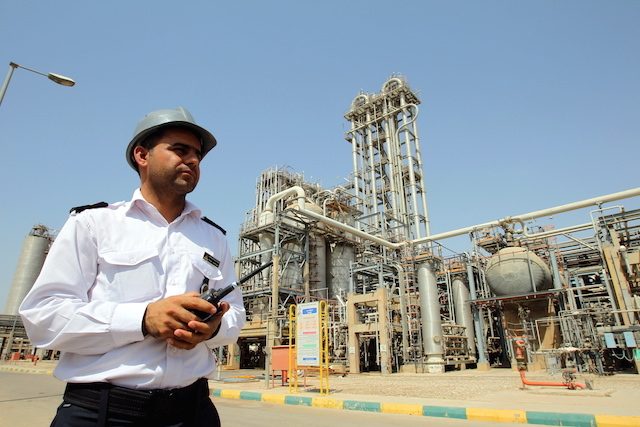SUMMARY
This is AI generated summarization, which may have errors. For context, always refer to the full article.

London, United Kingdom – Iran’s intention to significantly increase oil output after the lifting of international sanctions risks more pressure on crude prices already at 12-year lows, according to analysts.
Oil prices tumbled by more than 30 percent last year and have slumped by a further 20 percent since the beginning of 2016 — culminating in drops below $30 a barrel last week.
“The immediate impact of the news that Iran is returning to the market will almost certainly be bearish for oil prices,” Fawad Razaqzada, an oil analyst at Forex.com, told Agence France-Presse.
“Given that this is mostly priced in however, we probably wouldn’t see a massive reaction. The full impact may be felt when the market knows how much oil Iran will actually produce and what the response from its competitors will be.”
The Islamic Republic’s move to hike production comes after an agreement negotiated in July between Tehran, Britain, China, France, Germany and the United States to limit Iran’s controversial nuclear programme in exchange for a progressive lifting of sanctions, including those related to oil exports.
While the progressive removal of international sanctions limits Iran’s return to full production capacity, additional exports to a market already well oversupplied does not bode well for prices.
“If Iran’s goal is reached, this will not fundamentally change the current state of the oil market,” Saxo Bank analyst Christopher Dembik told Agence France-Presse.
“This will of course result in greater oversupply but it will not be decisive to the evolution of oil price over the year,” he added.
Iran insists that it will not concede on its level of production once the international nuclear agreement comes into force.
According to analysts at Commerzbank, Tehran could resort to a progressive production increase to limit the pressure on oil prices, a view supported by the president of the National Iranian Oil Company.
And it claims that it will produce 500,000 additional barrels of oil per day once the sanctions are lifted, rising to an extra one million barrels before the end of the year.
Foreign investment
The estimates appear credible to many analysts, since it produced 4.0 million barrels per day before the international sanctions were imposed, and is currently pumping 3.0 million.
“I think Iran will easily be able to scale up oil production by up to 500,000 barrels per day initially, but the question is will it be able to sell the additional barrels,” said Razaqzada.
Another unknown is the reaction of Iran’s competitors, especially within the Organization of the Petroleum Exporting Countries (OPEC), of which Tehran was the second largest producer before 2012.
“Will OPEC accommodate for this additional supply by reducing output? I have serious doubts about that, especially given the increased tensions between Iran and Saudi Arabia,” added Razaqzada.
Most commentators consider that the recent escalation of tensions between Riyadh and Tehran could compromise the chances of OPEC members agreeing on reducing the cartel’s production.
Dembik meanwhile highlighted the poor state of infrastructure in the country, posing uncertainty to the pace at which Iran will return to pre-sanctions levels.
“The production infrastructure has aged due to the sanctions applied. There is a major need for upgrading and therefore to attract foreign investment,” he explained.
According to Dembik, Iran’s ability to export will hinge on its capacity to attract foreign investment. Tehran has meanwhile engaged in a charm offensive directed at investors since the signature of the nuclear agreement. – Juliette Rabat, AFP/Rappler.com
Add a comment
How does this make you feel?
There are no comments yet. Add your comment to start the conversation.